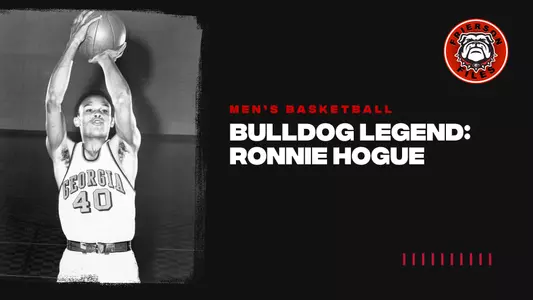
Ronnie Hogue: ‘A Really Good Man’
September 23, 2020 | General, Men's Basketball, The Frierson Files
By John Frierson
Staff Writer
Not long after Ronnie Hogue played one of the best games ever on Georgia's home court, lighting up LSU for 46 points on Dec. 20, 1971, the talented guard was heading home to the Washington, D.C., area for Christmas break. Driving him to the airport was men's basketball team manager Dave Muia.
"He was feeling good after that," Muia said of Hogue, Georgia's first Black scholarship basketball player, who died last Friday at age 69.
"That's a great way to go home for Christmas break. He was just on fire that day."
Hogue's huge game against the Tigers inside Georgia Coliseum (now Stegeman Coliseum) remains the most points ever scored by a Bulldog on his home court and the second-most points ever scored by a Georgia player ever. Hogue hit 20 field goals that night, which is still the school record for shots made in a game.
"It was all jumpers from 15-20 feet, it was a great performance," said fellow guard Gino Gianfrancesco, who got the assist on a lot of those baskets. "I just threw it to Ronnie and he made it. ... I can see him now just jumping up from the corner and making them."
In 77 career games over three seasons — freshmen weren't eligible back then — Hogue amassed 1,367 points, an average of 17.8 points per game, which still ranks sixth on Georgia's all-time list. Those numbers would have been even higher, Muia said, if the 3-point line had existed back when Hogue played.
An All-SEC player during the 1971-72 season, when he averaged 20.5 points and 4.3 rebounds a game, Hogue used his speed to get out ahead of everyone on the fast break, and he often got into the spot he liked in the corner. He shot 54.0 percent from the field that season.
"A lot of those shots were from 3-point range," Muia said. "He was shooting them from the deep corner."
While the 46-point show he put on against LSU was Hogue's legendary performance, it's another, more unusual game that stands out most in Gianfrancesco's memory. It was during the 1970-71 season, and the day after losing at Vanderbilt, Hogue had gone to sleep with his contact lenses in and somehow scratched one of his eyes. Georgia was on the road playing at Alabama the next day, so there wasn't much to be done about it.
"They put a patch on his eye and we played against Alabama on Monday," Gianfrancsco said, laughing, "and he hits a 30-foot jumper at the buzzer and we won by one. And he did it with one eye."
Hogue's one-eyed buzzer-beater lifted the Bulldogs to a 71-70 win over the Crimson Tide, just one of six victories for Georgia that season.
"He was very unselfish, very team-oriented, but he also loved having the ball in his hands at the end," Muia said. "I just wish we would have had more success as a team."
Hogue's arrival and success helped pave the way for other Black student-athletes to sign with Georgia. Another Black player from the D.C. area, Tim Bassett, started alongside Hogue during the 1971-72 and 1972-73 seasons, and coach Vince Dooley signed five Black football players that enrolled in the fall of 1971. Bassett, an All-SEC center in 1973, passed away in December 2018.
Georgia's J. Reid Parker Director of Athletics, Greg McGarity, saw plenty of Hogue back then. Before enrolling at Georgia in the summer of 1972, McGarity was a local high school student working for Dan Magill in the sports information office, so he was constantly around the coliseum.
"Ronnie might not have known who I was back in those days, but I knew who he was," McGarity said.
In the past four or five years, McGarity said, the two would talk often on the phone.
"He'd text out of the blue and we'd have conversations — he was very, very involved in all Georgia sports," McGarity said. "He would call and say he's got a recruit up in Washington, D.C., that we need to be looking at, regardless of what sport."
As one of the few Black basketball players in the SEC when he started at Georgia, it wasn't always easy for Hogue, Muia said. The crowds at road games were often rude and hostile.
"I think when Ronnie would go to a place and get called names, I think it made him play even harder," Muia said. "I think he just wanted to just shut them up, and the best way to do that was to play the game he enjoyed the most."
The negative experiences that Hogue had didn't affect his love for Georgia or his appreciation for his time as a Bulldog. He was honored at a Georgia basketball game two years ago and a lot of his former teammates were there to share in the moment with him.
"It was really, really great to see him interact with all the former teammates," McGarity said.
"We had a beer together before the game," Gianfrancesco said. "That was great, I hadn't seen him in 25 years."
McGarity and Hogue spoke just a few weeks ago and talked about the upcoming football season, McGarity said.
"He was all about Georgia and he loved his experience here," McGarity said. "He always would say that some of the best days of his life we at Georgia and he learned so much. I remember he said, 'I wouldn't have wanted to do it any other way.'
"He was really a good man and we'll all miss him."
Staff Writer
Not long after Ronnie Hogue played one of the best games ever on Georgia's home court, lighting up LSU for 46 points on Dec. 20, 1971, the talented guard was heading home to the Washington, D.C., area for Christmas break. Driving him to the airport was men's basketball team manager Dave Muia.
"He was feeling good after that," Muia said of Hogue, Georgia's first Black scholarship basketball player, who died last Friday at age 69.
"That's a great way to go home for Christmas break. He was just on fire that day."
Hogue's huge game against the Tigers inside Georgia Coliseum (now Stegeman Coliseum) remains the most points ever scored by a Bulldog on his home court and the second-most points ever scored by a Georgia player ever. Hogue hit 20 field goals that night, which is still the school record for shots made in a game.
"It was all jumpers from 15-20 feet, it was a great performance," said fellow guard Gino Gianfrancesco, who got the assist on a lot of those baskets. "I just threw it to Ronnie and he made it. ... I can see him now just jumping up from the corner and making them."
In 77 career games over three seasons — freshmen weren't eligible back then — Hogue amassed 1,367 points, an average of 17.8 points per game, which still ranks sixth on Georgia's all-time list. Those numbers would have been even higher, Muia said, if the 3-point line had existed back when Hogue played.
An All-SEC player during the 1971-72 season, when he averaged 20.5 points and 4.3 rebounds a game, Hogue used his speed to get out ahead of everyone on the fast break, and he often got into the spot he liked in the corner. He shot 54.0 percent from the field that season.
"A lot of those shots were from 3-point range," Muia said. "He was shooting them from the deep corner."
While the 46-point show he put on against LSU was Hogue's legendary performance, it's another, more unusual game that stands out most in Gianfrancesco's memory. It was during the 1970-71 season, and the day after losing at Vanderbilt, Hogue had gone to sleep with his contact lenses in and somehow scratched one of his eyes. Georgia was on the road playing at Alabama the next day, so there wasn't much to be done about it.
"They put a patch on his eye and we played against Alabama on Monday," Gianfrancsco said, laughing, "and he hits a 30-foot jumper at the buzzer and we won by one. And he did it with one eye."
Hogue's one-eyed buzzer-beater lifted the Bulldogs to a 71-70 win over the Crimson Tide, just one of six victories for Georgia that season.
"He was very unselfish, very team-oriented, but he also loved having the ball in his hands at the end," Muia said. "I just wish we would have had more success as a team."
Hogue's arrival and success helped pave the way for other Black student-athletes to sign with Georgia. Another Black player from the D.C. area, Tim Bassett, started alongside Hogue during the 1971-72 and 1972-73 seasons, and coach Vince Dooley signed five Black football players that enrolled in the fall of 1971. Bassett, an All-SEC center in 1973, passed away in December 2018.
Georgia's J. Reid Parker Director of Athletics, Greg McGarity, saw plenty of Hogue back then. Before enrolling at Georgia in the summer of 1972, McGarity was a local high school student working for Dan Magill in the sports information office, so he was constantly around the coliseum.
"Ronnie might not have known who I was back in those days, but I knew who he was," McGarity said.
In the past four or five years, McGarity said, the two would talk often on the phone.
"He'd text out of the blue and we'd have conversations — he was very, very involved in all Georgia sports," McGarity said. "He would call and say he's got a recruit up in Washington, D.C., that we need to be looking at, regardless of what sport."
As one of the few Black basketball players in the SEC when he started at Georgia, it wasn't always easy for Hogue, Muia said. The crowds at road games were often rude and hostile.
"I think when Ronnie would go to a place and get called names, I think it made him play even harder," Muia said. "I think he just wanted to just shut them up, and the best way to do that was to play the game he enjoyed the most."
The negative experiences that Hogue had didn't affect his love for Georgia or his appreciation for his time as a Bulldog. He was honored at a Georgia basketball game two years ago and a lot of his former teammates were there to share in the moment with him.
"It was really, really great to see him interact with all the former teammates," McGarity said.
"We had a beer together before the game," Gianfrancesco said. "That was great, I hadn't seen him in 25 years."
McGarity and Hogue spoke just a few weeks ago and talked about the upcoming football season, McGarity said.
"He was all about Georgia and he loved his experience here," McGarity said. "He always would say that some of the best days of his life we at Georgia and he learned so much. I remember he said, 'I wouldn't have wanted to do it any other way.'
"He was really a good man and we'll all miss him."
Assistant Sports Communications Director John Frierson is the staff writer for the UGA Athletic Association and curator of the ITA Men's Tennis Hall of Fame. You can find his work at: Frierson Files. He's also on Twitter: @FriersonFiles and @ITAHallofFame.
Georgia Men's Basketball Media Availability - Marcus "Smurf" Millender
Monday, September 22
Georgia Men's Basketball Media Availability - Jeremiah Wilkinson
Monday, September 22
Georgia Basketball - Coach Mike White - Media Availability
Monday, September 15
Georgia Basketball - Dylan James - Media Availability
Monday, September 15







